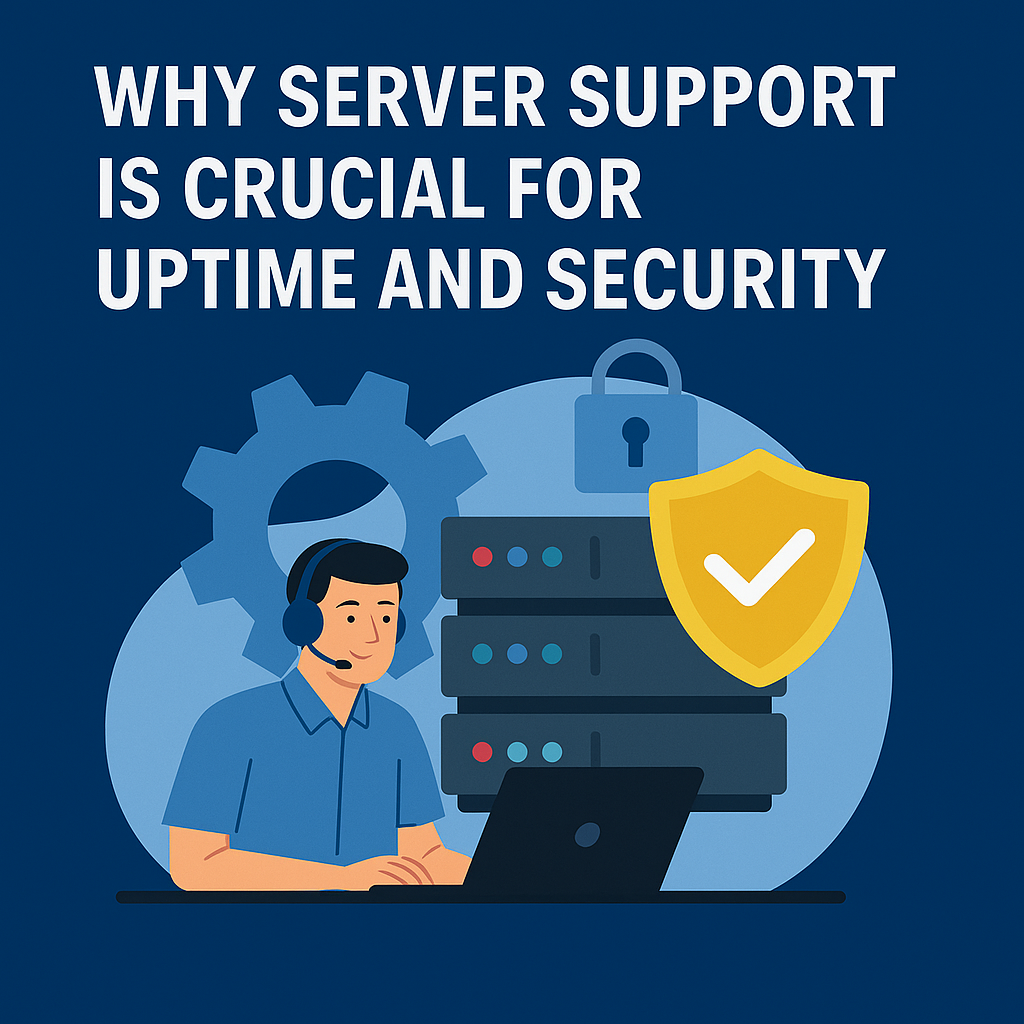How Regular Server Support Can Save Your Business Money

Server downtime costs businesses an average of $5,600 per minute, according to recent industry studies. Yet many companies still view server support as an unnecessary expense rather than a strategic investment. Regular server maintenance and professional server support services can dramatically reduce operational costs while protecting your business from catastrophic failures.
The Hidden Costs of Neglecting Server Maintenance
Downtime Expenses That Drain Your Budget
When servers fail without warning, the financial impact extends far beyond simple repair costs. Lost productivity, missed sales opportunities, and damaged customer relationships create a cascade of expenses that can cripple even established businesses.
Small businesses typically lose $137 to $427 per minute during server outages, while enterprise organizations face losses ranging from $2,300 to $9,000 per minute. These figures don’t account for long-term reputation damage or customer churn that follows extended downtime periods.
Emergency Support Premium Pricing
Reactive server repairs cost significantly more than preventive maintenance. Emergency technician rates often double or triple standard pricing, especially during nights, weekends, and holidays when critical failures typically occur.
Emergency hardware replacement also carries premium costs due to expedited shipping and limited vendor availability. Companies frequently pay 40-60% more for urgent server components compared to planned purchases.
Proactive Server Support: Your Financial Safety Net
Scheduled Maintenance Prevents Expensive Failures
Regular server maintenance identifies potential issues before they escalate into costly emergencies. Professional technicians perform comprehensive health checks, update software patches, and replace aging components during planned maintenance windows.
This proactive server management approach reduces unexpected downtime by up to 85% compared to reactive support models. Scheduled maintenance also extends server lifespan by 3-5 years, maximizing hardware investment returns.
Predictable Monthly Costs vs. Surprise Expenses
Monthly support services contracts provide budget predictability that emergency repairs cannot match. Fixed monthly fees allow accurate financial planning while protecting against unexpected technology expenditures.
Support contracts typically include monitoring services, regular updates, and priority response times. This comprehensive coverage costs significantly less than paying for individual emergency service calls throughout the year.
Performance Optimization Saves Money Daily
Improved Efficiency Reduces Operating Costs
Well-maintained servers operate more efficiently, consuming less electricity and generating less heat. Regular cleaning, software optimization, and hardware tuning can reduce energy consumption by 15-25%.
Optimized servers also process requests faster, reducing the need for additional hardware investments. A single properly maintained server often outperforms multiple neglected machines.
Reduced Need for Hardware Upgrades
Regular maintenance extends server hardware lifespan while maintaining optimal performance levels. Clean systems with updated drivers and optimized configurations delay expensive upgrade cycles.
Professional support teams also provide guidance on strategic hardware investments, helping businesses avoid unnecessary purchases while ensuring adequate capacity for future growth.
Security Benefits That Protect Your Bottom Line
Cybersecurity Threats Cost More Than Prevention
Data breaches cost businesses an average of $4.45 million per incident, not including regulatory fines and legal expenses. Regular server security updates and monitoring prevent most common attack vectors.
Professional IT server support includes security patch management, vulnerability assessments, and threat monitoring services. These preventive measures cost thousands of dollars annually compared to millions in potential breach damages.
Compliance Maintenance Avoids Penalties
Many industries require specific server security standards and data protection measures. Regular compliance audits and updates through professional support services help avoid regulatory fines and legal complications.
Non-compliance penalties can reach hundreds of thousands of dollars, making preventive compliance support an essential business investment rather than optional expense.
Strategic Business Advantages
Competitive Edge Through Reliability
Businesses with reliable server infrastructure gain competitive advantages over companies experiencing frequent technical problems. Consistent uptime builds customer trust and supports business growth.
Professional support ensures your technology infrastructure supports business objectives rather than hindering progress. This reliability directly translates to increased revenue and market share.
Scalability Planning Prevents Overinvestment
Experienced support teams provide capacity planning guidance that prevents both under-provisioning and expensive over-investment in server resources. Right-sized infrastructure reduces unnecessary costs while ensuring adequate performance.
Professional monitoring also identifies usage patterns that inform strategic technology decisions, helping businesses invest in appropriate solutions for their specific needs.
Choosing the Right Server Support Model
Managed Services vs. Break-Fix Support
Managed support services company solutions provide comprehensive coverage including monitoring, maintenance, and emergency response for predictable monthly fees. This model typically costs 40-60% less than break-fix support over time.
Break-fix support charges for each individual service call, creating unpredictable expenses and incentivizing reactive rather than preventive maintenance approaches.
Internal vs. External Support Teams
Building internal server support capabilities requires significant investment in training, tools, and personnel. Outsourced server support services provide expert-level assistance without the overhead costs of maintaining specialized staff.
External support teams also offer 24/7 availability and diverse expertise that most businesses cannot afford to maintain internally. With the virtual private server market size expanding rapidly, specialized external expertise becomes increasingly valuable for businesses managing complex virtualized environments.
Measuring Return on Investment
Calculating Support Cost Benefits
Compare monthly support costs against potential downtime expenses, emergency repair fees, and lost productivity to calculate clear ROI. Most businesses see positive returns within 6-12 months of implementing regular support services.
Track metrics including uptime percentages, response times, and prevented failures to quantify support value beyond simple cost comparisons.
Long-term Financial Impact
Server support creates compounding financial benefits over time. Extended hardware lifespan, improved efficiency, and prevented disasters accumulate significant savings across multiple budget cycles.
Businesses with consistent support also experience fewer insurance claims, reduced liability exposure, and improved operational efficiency that supports overall profitability.
Implementation Best Practices
Selecting Support Partners
Choose server support company providers with proven expertise in your specific technology stack and industry requirements. Evaluate response times, escalation procedures, and customer references carefully.
Look for providers offering comprehensive service level agreements that guarantee specific performance metrics and response times. A reliable server support services company for 24/7 monitoring ensures continuous oversight of your critical infrastructure.
Establishing Monitoring Systems
Implement comprehensive server monitoring that tracks performance metrics, security events, and capacity utilization. Early warning systems prevent minor issues from becoming major problems.
Regular reporting provides visibility into server health and supports informed decision-making about infrastructure investments and upgrades. Modern cloud server support solutions offer scalable monitoring capabilities that grow with your business needs. IT teams equipped with essential tools for IT technicians can better identify and resolve issues before they impact operations.
Frequently Asked Questions
How much does server support typically cost?
Monthly server support costs range from $100-500 per server for basic monitoring and maintenance, while comprehensive managed services typically cost $500-2000 monthly depending on server complexity and service level requirements.
What’s included in professional server support services?
Standard server support includes 24/7 monitoring, regular maintenance, security updates, performance optimization, backup management, and emergency response services. Advanced packages may include strategic planning and compliance assistance.
How quickly can server support services respond to emergencies?
Professional support services typically guarantee 15-minute response times for critical issues, with on-site technician availability within 2-4 hours for hardware problems requiring physical intervention.
Can small businesses afford professional server support?
Small business server support services often provide the most value due to limited internal IT resources. Many providers offer scalable packages starting at $200-400 monthly for basic coverage, making professional support accessible even for budget-conscious organizations.
What happens if my server fails despite having support?
Comprehensive support agreements include failure recovery services, emergency hardware replacement, and business continuity assistance. Most providers guarantee specific restoration timeframes in their service level agreements.
How do I know if my current server support is adequate?
Evaluate your support based on response times, prevented failures, uptime percentages, and overall cost compared to emergency repairs. Regular service reviews with your provider help identify improvement opportunities.
Should I choose local or remote server support?
Remote support provides 24/7 availability and often costs less than local services. However, local support may be necessary for hardware issues requiring physical intervention. Many businesses use hybrid approaches combining both options.
How does server support integrate with existing IT operations?
Professional IT server support services work alongside internal IT teams, providing specialized expertise and additional capacity during emergencies. Clear communication protocols ensure seamless coordination between internal and external resources. Organizations addressing top business challenges solved by VoIP implementation often find that comprehensive server support becomes crucial for maintaining communication system reliability and ensuring VoIP business continuity.
Conclusion
Server support represents a strategic investment that protects your business from costly downtime while optimizing operational efficiency. The predictable monthly costs of professional support services pale in comparison to the catastrophic expenses of server failures and emergency repairs.
Businesses that prioritize proactive server maintenance consistently outperform competitors while maintaining lower technology costs over time. Whether managing traditional databases or navigating the SQL server transformation market, comprehensive support ensures smooth operations. Don’t wait for disaster to strike – implement comprehensive server support today and transform your IT infrastructure from a cost center into a competitive advantage.
Smart businesses recognize that server support isn’t just about fixing problems – it’s about preventing them entirely while building a foundation for sustainable growth and success.




No comment